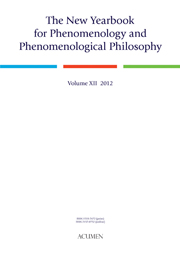Book contents
- Frontmatter
- Contents
- Articles
- Documents
- In Review
- Making Sense of Husserl's Early Writings on Mathematics: Stefania Centrone, Logic and Philosophy of Mathematics in the Early Husserl
- Commentary on Some Themes in Stefania Centrone's Logic and Philosophy of Mathematics in the Early Husserl
- Mathematical Existence, Mathematical Fictions, Etiological Proofs and Other Matters: Replies to Mirja Hartimo and Robert Tragesser
- Stefania Centrone, Logic and Philosophy of Mathematics in the Early Husserl
- Reply to Mark van Atten: on Husserl-Computable Functions
The Self, Its Ideal, and God: The Implications of Non-Objective Self-Experience
from In Review
- Frontmatter
- Contents
- Articles
- Documents
- In Review
- Making Sense of Husserl's Early Writings on Mathematics: Stefania Centrone, Logic and Philosophy of Mathematics in the Early Husserl
- Commentary on Some Themes in Stefania Centrone's Logic and Philosophy of Mathematics in the Early Husserl
- Mathematical Existence, Mathematical Fictions, Etiological Proofs and Other Matters: Replies to Mirja Hartimo and Robert Tragesser
- Stefania Centrone, Logic and Philosophy of Mathematics in the Early Husserl
- Reply to Mark van Atten: on Husserl-Computable Functions
Summary
Abstract: This article explicates the unified argument of James G. Hart's 1200 page work Who One Is. Hart begins with an exploration of the non-objective self as propertyless ipseity; then relates that sheer ipseity to the concrete development a self; and then, that self to the ideal self which guides its development; and finally, the ideal self to God as its origin. Hart also shows the relevance of Jaspers' notion of Existenz at each of these stages. The uniqueness and “mineness” of any “I” cannot be a matter of properties. Each “I” is a unique “haecceity” for which multiple instantiation would be meaningless. Hart concludes with a fully developed theology of selfhood according to which God's creation of the “haecceities” is an act of sheer generosity.
Keywords: self, ipseity, haecceity, Existenz, phenomenological theology, James G. Hart
This essay pulls together, explains, and evaluates the overall argument of James Hart's two-volume work Who One Is. Hart's work is path-breaking for four reasons: it represents an extremely detailed and rigorous re-visioning of Husserlian phenomenology in the light of Michel Henry's philosophy of non-objective self-awareness; in that context, it develops a new Husserlian ethics; with that ethics as a starting point, it integrates Christian—specifically Thomistic—theology with phenomenology; and finally, it does all of this in dialogue with multiple traditions.
- Type
- Chapter
- Information
- Publisher: Acumen PublishingPrint publication year: 2013



